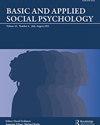有多少证据就足够了?科学结论判断中的偏差阈值
IF 1.8
3区 心理学
Q2 PSYCHOLOGY, SOCIAL
引用次数: 0
摘要
摘要人们对科学信息的消费有偏见。目前的研究调查了结论阈值,检验了这样一种假设,即需要更多的科学证据才能得出非首选结论而非首选结论。参与者阅读了探索同性恋本质的科学研究的简要摘要(研究1;N = 126)和支持民主党或共和党在该问题上立场的航空安全(研究2;N = 311)。参与者阅读摘要,直到对证据得出结论。支持这些假设的是,当这些研究的结果支持他们的首选结论时,参与者阅读的研究摘要比不支持他们的结论时更少。建议的重点是科学界和科学新闻界如何解决这种偏见。本文章由计算机程序翻译,如有差异,请以英文原文为准。
How Much Evidence Is Enough? Biased Thresholds in Judgments of Scientific Conclusions
Abstract People are biased in their consumption of scientific information. The current research investigated conclusion thresholds, testing the hypothesis that more scientific evidence is needed to arrive at a non-preferred than a preferred conclusion. Participants read brief summaries of scientific studies exploring the nature of homosexuality (Study 1; N = 126) and air safety that supported either the Democratic or the Republican position on the issue (Study 2; N = 311). Participants read summaries until a conclusion could be made about the evidence. Supporting the hypotheses, participants read fewer study summaries when the results of those studies supported their preferred conclusion than when they did not. Recommendations focus on how the scientific community and science journalism can address this bias.
求助全文
通过发布文献求助,成功后即可免费获取论文全文。
去求助
来源期刊

Basic and Applied Social Psychology
PSYCHOLOGY, SOCIAL-
CiteScore
4.50
自引率
12.50%
发文量
7
期刊介绍:
Basic and Applied Social Psychology (BASP) emphasizes the publication of outstanding research articles, but also considers literature reviews, criticism, and methodological or theoretical statements spanning the entire range of social psychological issues. The journal will publish basic work in areas of social psychology that can be applied to societal problems, as well as direct application of social psychology to such problems. The journal provides a venue for a broad range of specialty areas, including research on legal and political issues, environmental influences on behavior, organizations, aging, medical and health-related outcomes, sexuality, education and learning, the effects of mass media, gender issues, and population problems.
 求助内容:
求助内容: 应助结果提醒方式:
应助结果提醒方式:


